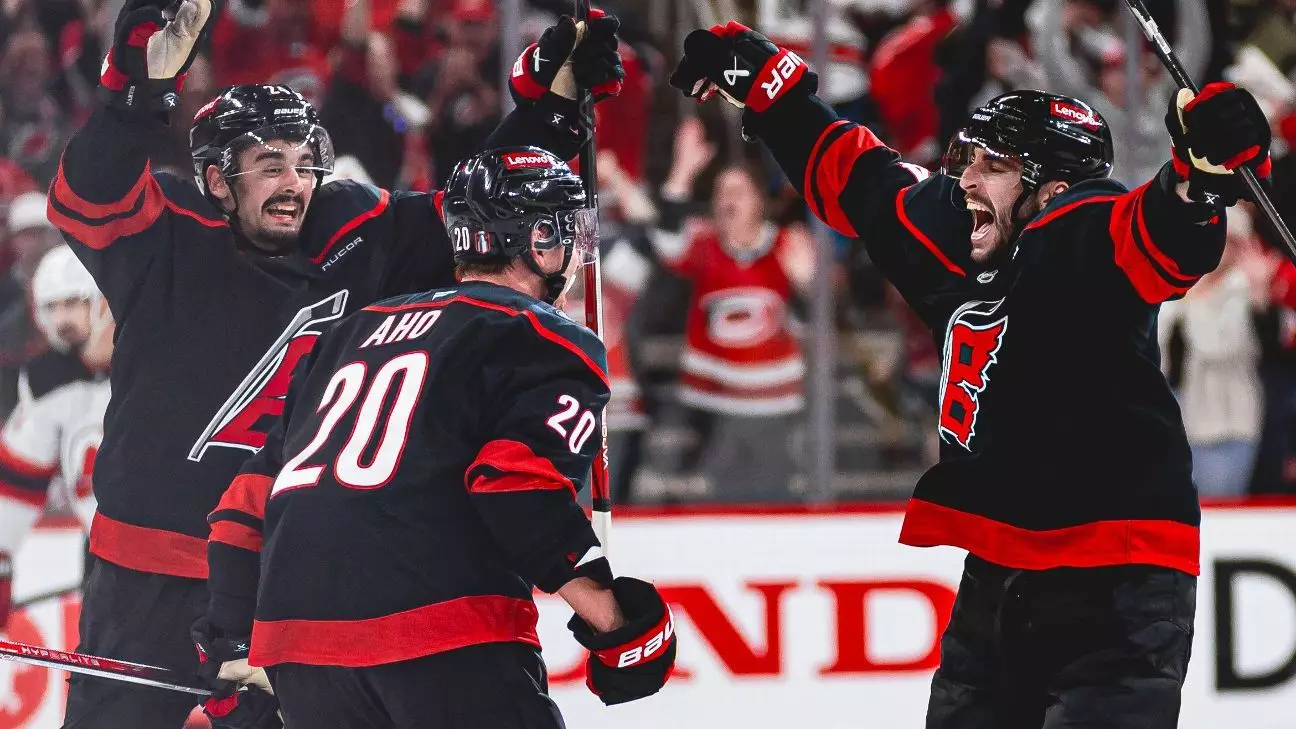In a heart-wrenching postseason encounter, the New Jersey Devils fell to the Carolina Hurricanes in an exhausting double overtime duel, culminating in a 5-4 defeat that ended their season prematurely. Goaltender Jacob Markstrom’s reaction was palpable; he expressed his discontent not through words but through an impulsive act of frustration. In an emotional moment, Markstrom struck his goalpost, effectively breaking his stick in half—a visual representation of the pent-up frustration that defined the Devils’ campaign.
What made this loss particularly bitter was the way it unfolded. The Devils initially established control with a 3-0 lead, providing a glimmer of hope that was swiftly dashed. The Hurricanes erupted in the second period, scoring three times within an astonishingly short span, effectively flipping the script on a game that seemed to be unfolding in the Devils’ favor. Markstrom’s performance was remarkable, especially against relentless pressure; he had repelled 49 shots, including 18 during the crucial overtimes. Yet, one mistake—a goal by Sebastian Aho early in the second overtime—would overshadow his otherwise stellar display.
The Highs and Lows of Playoff Goaltending
Markstrom’s playoff journey had its share of highs and lows. Acquired from the Calgary Flames in a bold move aimed at revitalizing the team’s woeful goaltending situation, his season statistics offered promise: 26 wins in 49 appearances, paired with a respectable 2.50 goals-against average. Nevertheless, the playoffs revealed the stark reality that statistics can’t always translate to success on the ice. Despite showing a .911 save percentage in the postseason, injuries and a faltering special teams unit proved critical hindrances.
Coach Rod Brind’Amour praised Markstrom’s performance even amid frustration, signifying the respect he commanded for his efforts. His 49-save effort was nothing short of heroic, yet the emotional toll of knowing that even an outstanding performance could not secure a victory was evident. Markstrom himself echoed this sentiment, highlighting the disappointment of not being able to capitalize on a 4-goal outing as a team.
The Injuries That Plagued the Devils
The injury list for the Devils read like a horror story. Key players such as Jack Hughes were sidelined early on, an absence that undoubtedly diminished the team’s offensive potency. As the series progressed, the departures of defensemen like Luke Hughes and Johnathan Kovacevic only amplified their struggles. The defensive lineup was uneven, with players like Jonas Siegenthaler and Dougie Hamilton not fully healthy, which hampered their capability to form a cohesive unit against a formidable Hurricane onslaught.
Timo Meier voiced what many felt in the locker room when he stated, “We had a few guys go down in the series… We’ve got to get better. We don’t like the result.” These words underscored not only the physical toll the series took on the team but also the mental fortitude required to push through such adversity. The emotional strain was evident, with players feeling the weight of their injuries compounded by their inability to perform as they knew they could.
The Special Teams Breakdown
One of the most glaring deficiencies that haunted the Devils was their special teams’ performance, which was abysmal at best. The power play’s failure to convert on 15 opportunities has become a scapegoat for the series’ outcome. Furthermore, their penalty kill struggled significantly, allowing six goals across 19 power plays to the Hurricanes. It’s a harsh reality to face, especially when pivotal games can be swayed by the ability to score during crucial moments or to deny the opponent’s offensive threats.
Nico Hischier’s acknowledgment of the power play’s shortcomings reflects a collective frustration; “That’s why we lost the series for sure.” This candid admission signals that the players themselves recognize the role that failed special teams played in their early exit. It’s easy to point fingers at injuries or unfavorable bounces of the puck, but when a team is unable to seize opportunities on the power play or defend effectively on their penalty kill, it inevitably leads to a premature end to their season.
Ultimately, the emotional impact of this series extends beyond the ice; it shapes the future of the franchise. Markstrom’s assertion that there is “a lot of will” in the room signals a promise of resilience. Yet, this playoff exit serves as a stark reminder that even when determination runs high, practical execution—especially in crucial moments—remains imperative to achieving success. The Devils may need to reflect deeply as they regroup and look ahead to what the next season has in store.

